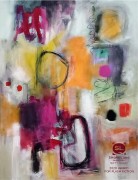There’s a recurring theme in this story of loss and new beginnings. Since I’m interested in work histories in fiction, what did your narrator do before starting over at the Hak Island Lighthouse?
“Cupola” actually began as a four-thousand-word horror story called “The Caretaker.” That’s right, the first draft of “Cupola” was four thousand words long, and it was about a couple who, for various reasons (going broke being the primary one), were forced to move into the lighthouse as caretakers. They’d found the building listed under a remote facilities maintenance program and the job came with accommodations and a stipend—which was too good to be true, of course. They later discover that they were not the only ones on the island. Paranormal shenanigans ensue.
I’d sent the story in for critiquing at the Tahoma Literary Review, and as expected, the editor there tore it to pieces. It took me a few days to recover from the shredding, but through that process, I realized that the true horror wasn’t some external-paranormal-ghosty-thing but lies somewhere between the fear of losing a loved one and the fear of losing one’s grip on reality.
I guess what I’m saying is that there are actually three “new beginnings”: Two are in the text (first, their arrival at the island—depicted in the final flashback—and second, in the cupola when he decides he’s had enough.) The third is when the horror story “The Caretaker” took a turn and became the flash story, “Cupola.”
But to answer your question: The narrator in “The Caretaker” gets laid off from his junior building surveyor job before taking the job at the lighthouse. I suppose you could assume something similar happened prior to “Cupola.”
Does the author particularly enjoy these lighthouse monoliths dotting our shores? Do you live by a lighthouse structure? Have you visited it? If not, what drew you to imagine the lighthouse as setting?
Hak Island Lighthouse was inspired by a real listing on a property directory—the Hong Kong Government Property Agency. It’s a site that lists all kinds of interesting (and abandoned) structures for rent. As of this writing there are listings for “Raw Water Pumping Station No. 2 Staff Quarters” and “Eastern Portion of Ex-Victoria Road Detention Centre.” I mean there’s absolutely nothing in the world that could convince me to spend a night in any of these places, but it’s fascinating to think about the possibilities.
The real lighthouse is on an island called Green Island, just off the coast of Hong Kong Island (where I live.) I changed the name to Hak Island because it sounded more ominous … compared to Green Island, which just sounds like a delightful, verdant paradise. In Cantonese, “haak” is black—make of that what you will.
I’m interested in this fragility/metaphor of the cupola. Such a fascinating word, and his encounter in the dome seems almost spiritual, igniting. What words or spellings most captivate you?
It’s a great word, isn’t it? I like the contrast between the word’s origins (a burying vault) and its contemporary meaning (a glass dome atop a tall structure). I think right from the start it gives the story an extra layer of nuance—is the island the main character’s final resting place, or does he find the strength to begin again after his revelation in the cupola? I think the decision ultimately rests with the reader—I haven’t quite decided yet myself, although I’d like to hope, that if I were in his shoes, I’d be able to find the strength to go on.
I’m trying to find an opportunity to use the word “obsequious” somewhere. So many scenarios, relationships, conflicts, and images—from the dark to the awkward to the humorous—come to mind when one thinks of that word. Rolls off the tongue, too.
Lighthouses are all the rage right now, if you count keepers going mad within their confines or comets crashing nearby to irrevocably mutate the flora, fauna, and physics of our world. There is also this visage of a slumbering beast in your story, if only to play tricks/sow doubt in the mind of the keeper. Did folklore inspire this fleeting moment in your story, the appearance of a monster projected onto the seas?
I’ve always been terrified of the deep. But at the same time, there’s something thrilling about imagining the horrors that lurk in the unknown—from the comfort of my desk or between the pages of a book, of course. I’d like to think I was channelling a bit of Lovecraftian madness.
I figured there were a few ways that I could imply hopeless isolation: one was through physical scale and distance—having something gargantuan appear as a blip on the horizon, teased occasionally between the fog, but never actually being able to reach it—and the other was through time—he wife that he dearly misses appears as if she’s there beside him one moment, again so close that he can reach out and touch her, but the next moment she exists only in his memory, separated by the infinite vastness of time.
Humor me: Hak Island sees a booming investment from the government that intends to draw settlers to its shores. What does the tourism board for Hak Island say about the history of this landmark?
Twenty-eight hundred square feet of prime shorefront real estate with spectacular unobstructed ocean views and a private jetty. Previous tenants reported missing.



 The core workshop of SmokeLong Fitness is all in writing, so you can take part from anywhere at anytime. We are excited about creating a supportive, consistent and structured environment for flash writers to work on their craft in a community. We are thrilled and proud to say that our workshop participants have won, placed, or been listed in every major flash competition. Community works.
The core workshop of SmokeLong Fitness is all in writing, so you can take part from anywhere at anytime. We are excited about creating a supportive, consistent and structured environment for flash writers to work on their craft in a community. We are thrilled and proud to say that our workshop participants have won, placed, or been listed in every major flash competition. Community works.